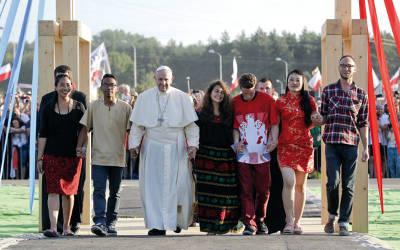The social doctrine of the Church is a subject of great importance, since it outlines the main principles of justice on which any society that is respectful of man must be based. This social teaching - formed mainly of the social encyclicals of the popes since Leo XIII - is a real treasure, if it were applied, the whole world would change, and we would have a world more in line with God’s plan for mankind.
 However, as several bishops already pointed out, this social doctrine is practically one of the “best kept secrets of the Church”, because it is not only ignored by society in general, but even by most Catholics as well - and therefore not implemented. One of the reasons for this ignorance is that this teaching is included in several encyclicals written over a period of more than 100 years.
However, as several bishops already pointed out, this social doctrine is practically one of the “best kept secrets of the Church”, because it is not only ignored by society in general, but even by most Catholics as well - and therefore not implemented. One of the reasons for this ignorance is that this teaching is included in several encyclicals written over a period of more than 100 years.
Pope Saint John Paul II wrote in his 1999 Post-synodal Apostolic Exhortation on the Church in America that “it would be very useful to have a compendium or approved synthesis of Catholic social doctrine, including a catechism which would show the connection between it and the new evangelization.” To answer this wish of the Holy Father, the Pontifical Council for Justice and Peace published, on October 25, 2004, the “Compendium of the Social Doctrine of the Church”, a 500-page book that summarizes the main texts of the Magisterium on the social teachings of the Catholic Church.
To summarize everything in just one book was already quite a feat, but given the number of pages, it was still difficult to read. A catechism on the social doctrine of the Church had yet to be made, as Pope Saint John Paul II wished.
Well, this wish has been finally accomplished now, with the release in July, 2016, during the World Youth Day in Krakow, Poland, of a catechism of the social doctrine made especially for the youth, in question and answer format, called DOCAT (pronounced “do-cat”). It was first published in German by the Austrian Bishops’ Conference, the same group that published YOUCAT, a similar catechism (with a yellow cover) that summarized in question-and-answer format the Catechism of the Catholic Church published by Pope Saint John Paul II in 1994. (In North America, DOCAT is published and available through Ignatius Press.) Pope Francis himself wrote the foreword of this new catechism. Below is this full introduction by the Holy Father:
«Dear Young People! My predecessor, Pope Benedict XVI, put into your hands a Youth Catechism, YOUCAT. Today I would like to commend to you another book, DOCAT, which contains the social doctrine of the Church.
The English verb “to do” is part of the title. DOCAT answers the question: “What should we do?”; it is like a user’s manual that helps us to change ourselves with the Gospel first, and then our closest surroundings, and finally the whole world. For with the power of the Gospel, we can truly change the world.
Jesus says: “As you did it to one of the least of these my brethren, you did it to me.” Many saints were shaken to the core by this passage from the Bible. On account of it, Saint Francis of Assisi changed his whole life. Mother Teresa converted because of this saying. And Charles de Foucauld acknowledges: “In all of the Gospel, there is no saying that had greater influence on me and changed my life more deeply than this: ‘Whatsoever you did for one of the least of my brethren, you did for me.’ When I reflect that these words come from the mouth of Jesus, the Eternal Word of God, and that it is the same mouth that says, ‘This is my Body,... this is my Blood...’, then I see that I am called to seek and to love Jesus above all in these little ones, in the least.”
Dear young friends! Only conversion of heart can make our world, which is full of terror and violence, more humane. And that means patience, justice, prudence, dialogue, integrity, solidarity with victims, the needy, and the poorest, limitless dedication, love even unto death for the sake of the other. When you have understood that quite deeply, then you can change the world as committed Christians. The world cannot continue down the path that it is taking now. If a Christian in these days looks away from the need of the poorest of the poor, then in reality he is not a Christian!
Can we not do more to make this revolution of love and justice a reality in many parts of this tormented planet? The social doctrine of the Church can help so many people! Under the experienced direction of Cardinals Christoph Schönborn and Reinhard Marx, a team set to work to bring the liberating message of Catholic social doctrine to the attention of the youth of the world. They collaborated with famous scholars and also with young people on this project. Young Catholic women and men from all over the world sent in their best photos. Other young people discussed the text, offered their questions and suggestions, and made sure that the text is readily comprehensible. Social doctrine calls that “participation”! The team itself applied an important principle of the social doctrine from the start. Thus DOCAT became a magnificent introduction to Christian action.
|
“I wish I had a million young Christians or, even better, a whole generation who are for their contemporaries ‘walking, talking social doctrine.’ Nothing else will change the world but people who with Jesus devote themselves to it.” – Pope Francis |
 Pope Francis walks with young pilgrims through the Door of Mercy as he arrives for a prayer vigil as part of World Youth Day in Krakow on July 30, 2016. Pope Francis walks with young pilgrims through the Door of Mercy as he arrives for a prayer vigil as part of World Youth Day in Krakow on July 30, 2016. |
What we call Catholic social teaching today came about in the nineteenth century. With industrialization, a brutal form of capitalism arose: a sort of economy that destroyed human beings. Unscrupulous industrialists reduced the impoverished rural population to the point where they toiled in mines or in rusty factories for starvation wages. Children no longer saw the light of day. They were sent underground like slaves to pull coal carts. With great commitment, Christians offered aid to those in need, but they noticed that that was not enough. So they developed ideas for counteracting the injustice socially and politically as well. Actually the fundamental proclamation of Catholic social doctrine was and is the 1891 encyclical letter by Pope Leo XIII, Rerum novarum, “On Capital and Labor.” The Pope wrote clearly and unmistakably: “To defraud any one of wages that are his due is a great crime which cries to the avenging anger of Heaven.” With the full weight of her authority, the Church fought for the rights of the workers.
Because the needs of the time demanded it, Catholic social teaching was increasingly enriched and refined over the years. Many people debated about community, justice, peace, and the common good. They found the principles of personhood, solidarity, and subsidiarity, which DOCAT, too, explains. But actually this social doctrine does not come from any particular pope or from any particular scholar. It comes from the heart of the Gospel. It comes from Jesus Himself. Jesus is the social teaching of God.
 “The Spirit of the Lord is on me, because he has anointed me to proclaim the “The Spirit of the Lord is on me, because he has anointed me to proclaim thegood news to the poor.” (Luke 4:18.) |
“This economy kills”, I wrote in my apostolic exhortation Evangelii Gaudium, for today that economy of exclusion and disparity of incomes still exists. There are countries in which 40 or 50 percent of the young people are unemployed. In many societies, older people are marginalized because they seemingly have no “value” and are no longer “productive”. Great stretches of land are depopulated because the poor of the earth flee to the slums of the major cities in the hope of finding something left there on which to survive. The production methods of a globalized economy have destroyed the modest economic and agricultural structures of their native regions. By now, approximately one percent of the world’s population owns 40 percent of the entire wealth of the world, and 10 percent of the world’s population owns 85 percent of the wealth. On the other hand, just about one percent of this world “belongs” to half of the world’s population. About 1.4 billion human beings live on less than one euro [approximately $1.10] per day.
When I invite you all now really to get to know the social doctrine of the Church, I am dreaming not just about groups that sit under trees and discuss it. That is good! Do that! My dream is of something greater: I wish I had a million young Christians or, even better, a whole generation who are for their contemporaries “walking, talking social doctrine”. Nothing else will change the world but people who with Jesus devote themselves to it, who with Him go to the margins and right into the middle of the dirt. Go into politics, too, and fight for justice and human dignity, especially for the poorest of the poor. All of you are the Church. Make sure, then, that this Church is transformed, that she is alive, because she allows herself to be challenged by the cries of the dispossessed, by the pleading of the destitute, and by those for whom nobody cares.
Become active yourselves, also. When many do that together, then there will be improvements in this world and people will sense that the Spirit of God is working through you. And maybe then you will be like torches that make the path to God brighter for these people.
And so I give you this magnificent little book, hoping that it might kindle a fire in you. I pray every day for you. Pray for me, too! Yours truly, Pope Francis.
* * *
When reading these last lines of the Holy Father, we too dream of countless young people who will not only study Social Credit (or Economic Democracy), but also become “torches” to make it known to others. Louis Even said: “Social Credit is a light on my path, everyone must know that.” And Mr. Even went as far as to leave his job and devote his entire life to make Social Credit known to others, precisely because the implementation of Social Credit would help the poor.
Young and old alike, take the time to study Social Credit , read the articles and books on the subject, and even come to our study sessions on Social Credit in Rougemont. And then you will also exclaim, like Louis Even, “What a light! Everybody must know that!” This is really a cause that is worth giving one’s entire life for. Industrialist Henry Ford Sr. once said: “The youth who can solve the money question will do more for the world than all the professional soldiers of history.” So, young and old, it is time to enrol in the army of the Pilgrims of St. Michael!